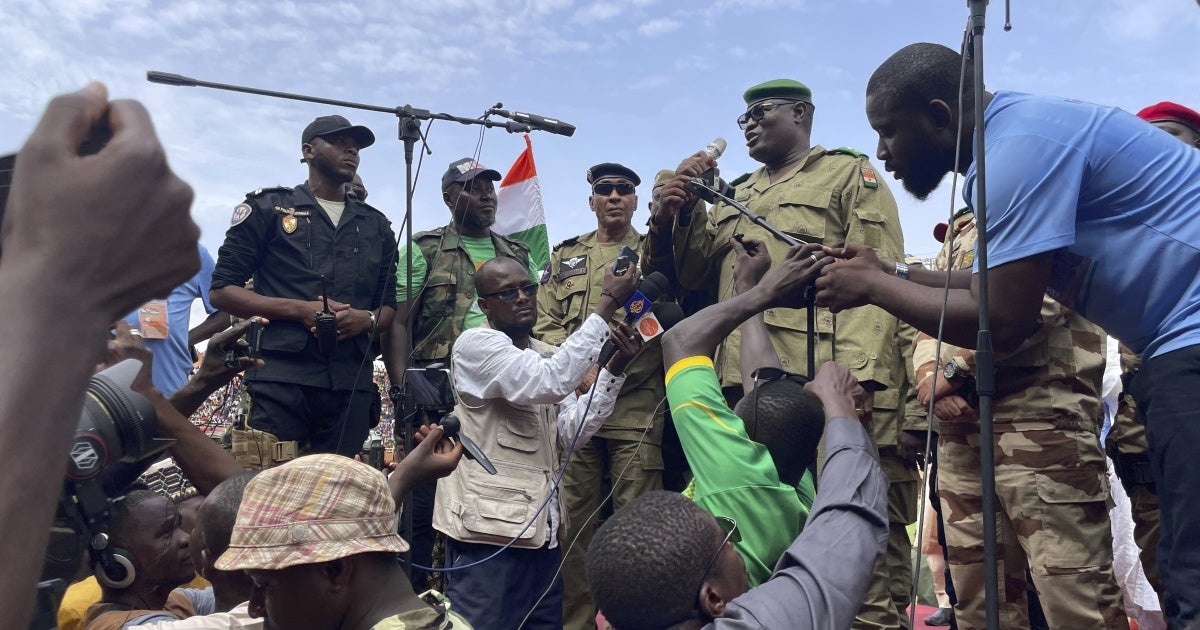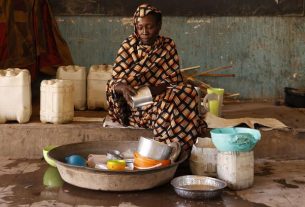(Nairobi) – The military authorities in Niger have cracked down on the opposition, media, and peaceful dissent since taking power in a coup one year ago, Amnesty International, Human Rights Watch and the International Federation for Human Rights (FIDH) said today.
They have arbitrarily detained former President Mohamed Bazoum, and at least 30 officials from the ousted government and people close to the deposed president, as well as several journalists. They have rejected oversight of military spending, contrary to claims to combat corruption. The Nigerien authorities should immediately release all those held on politically motivated charges; guarantee respect for fundamental freedoms, particularly the rights to freedom of expression, opinion, and association; and publicly commit to transparency and accountability in military spending.
“One year since the military coup, instead of a path toward respecting human rights and the rule of law, the military authorities are tightening their grip on opposition, civil society, and independent media,” said Samira Daoud, Amnesty International’s regional director for West and Central Africa. “Niger’s military authorities should release Bazoum as well as all those detained on politically motivated charges and ensure their due process rights.”
On July 26, 2023, Gen. Abdourahamane Tiani and other Nigerien army officers of the National Council for the Safeguard of the Homeland (Conseil national pour la sauvegarde de la patrie, CNSP) overthrew Mohamed Bazoum, elected as president in 2021, and arbitrarily detained him, his family, and several members of his cabinet. In response to the coup, the Economic Community of West African States (ECOWAS) on July 30, 2023, imposed sanctions, including economic sanctions, travel bans, and asset freezes, on the coup leaders and on the country more generally. On August 22, 2023, the African Union suspended Niger from its organs, institutions, and actions. On January 28, 2024, Niger, Burkina Faso, and Mali announced they would leave ECOWAS, and on February 24, ECOWAS lifted the sanctions on Niger.
Since the coup, Bazoum and his wife have been detained at the presidential palace in Niamey, the capital. The three organizations have repeatedly expressed concern about their well-being. In August 2023, the authorities announced plans to prosecute Bazoum for “high treason” and undermining national security, but he has yet to be brought before a judge. In September 2023, Bazoum filed a lawsuit with the ECOWAS Court of Justice in Abuja, citing violations of human rights against him and his family during his detention. In December 2023, the ECOWAS Court ruled that Bazoum was arbitrarily detained and called for his release. In April, the authorities initiated legal proceedings against Bazoum to lift his presidential immunity so he could be prosecuted for alleged crimes committed after he was elected president in 2021. On June 14 2024, Niger’s state court lifted the immunity following a proceeding that failed to meet basic due process and international fair trial standards, including the right to a defense.
Military authorities have also arbitrarily arrested at least 30 officials from the ousted government, including former ministers, members of the presidential cabinet, and people close to the deposed president, failing to grant them due process and fair trial rights. Lawyers representing those arrested said that their clients were detained in secret by the intelligence services, before being transferred to high-security prisons on trumped-up charges. At least four of them were granted bail in April, while all others were charged with “threatening state security,” among other offenses, before a military court, despite being civilians.
Since the 2023 coup, media freedom has been severely restricted in the country. The authorities have threatened, harassed, and arbitrarily arrested journalists, many of whom say they are self-censoring amid fear of reprisals.
On September 30, men who identified themselves as security force members arrested Samira Sabou, a blogger and journalist, at her mother’s home in Niamey. Sabou’s whereabouts remained unknown for seven days. The Niamey judicial police initially denied arresting her, but on October 7 she was transferred to the criminal investigations unit of the Niamey police, where her lawyer and her husband visited her. On October 11, she was charged with “production and dissemination of data likely to disturb public order” and released pending trial. No date has been set for the trial.
On January 29, the interior minister issued a decree suspending the activities of Maison de la Presse, an independent media organization, and announcing the creation of a new management committee for the media organization headed by the Interior Ministry’s Secretary General.
On April 13, security forces arrested Ousmane Toudou, a journalist and former communications adviser to the ousted president. In the days following the July 2023 coup, Toudou denounced the military takeover through a widely shared social media post. In May 2024, he was charged with “plotting against state security” and sent to pretrial detention.
On April 24, security forces arrested Soumana Maiga, the editor of the L’Enquêteur, after the newspaper reported a story published by a French newspaper about the alleged installation of listening equipment by Russian agents on official state buildings. He was taken before a judge in May, detained on a charge of infringement of national defense, and released pending trial on July 9.
Tchima Illa Issoufou, the Hausa language BBC radio correspondent in Niger, said that she received threats from members of the security forces accusing her of attempting to “destabilize Niger” because of her reporting on the security situation in the Tillabéri region, western Niger, where armed Islamist groups carry out attacks against both civilians and security forces. “I was attacked by junta supporters on social media,” she told Amnesty International in May after she fled Niger for another country. “They accused me of working under foreign influence.” On April 26, security forces arrested Ali Tera, a civil society activist whom Issoufou had interviewed.
On May 29, the justice and human rights minister issued a circular suspending all visits by human rights organizations to Nigerien prisons “until further notice,” in violation of national and international human rights law, including the Convention against Torture and Other Cruel, Inhuman or Degrading Treatment or Punishment, which Niger ratified in 1988.
On June 12, the justice and human rights minister issued a news release announcing that a 2019 law on cyber-crime had been amended. The law, which criminalized the “dissemination, production and making available to others of data that may disturb public order or threaten human dignity through an information system,” was the basis of a crackdown on human rights, including the right to freedom of expression online in 2020. In 2022, the Bazoum government, following a sustained civil society campaign, amended the law, replacing prison sentences with fines for defamation-related crimes. The June 12 amendments, however, reinstate prison sentences.
“The long list of attacks on journalists over the past year demonstrates the authorities’ determination to restrict press freedom and the right of access to information,” said Drissa Traoré, secretary general of the FIDH. “The amendment of the 2019 cyber-crime law is a dangerous step back that could be used to silence any voice deemed to be dissenting, and certainly to further target human rights defenders, activists and journalists. The Niger authorities must reverse this decision and guarantee freedom of expression.”
The African Charter on Human and Peoples’ Rights and the International Covenant on Civil and Political Rights, both of which Niger ratified in 1986, guarantee the rights to freedom of opinion and expression.
On February 23, Tiani, who vowed to fight corruption after taking power, signed an order repealing any control on military spending. The order states that “expenditure for the acquisition of equipment or materials or any other supplies, the performance of works or services for the defense and security forces […] shall be excluded from the scope of the legislation on public procurement and public accounting,” and shall also be exempt from taxation. Transparency in military budgeting and expenditure is crucial to addressing corruption and mismanagement and contributes to respect for human rights and the rule of law, adequate management of military expenditure, and government accountability, the organizations said.
“Public oversight of the military’s economic activities is not only critical for restoring civilian democratic rule and holding military officials accountable for abuses, but also for preventing the loss of public resources to corruption and mismanagement,” said Ilaria Allegrozzi, senior Sahel researcher at Human Rights Watch. “The Niger authorities should commit to transparency and accountability by immediately disclosing verifiable financial information about military spending.”



